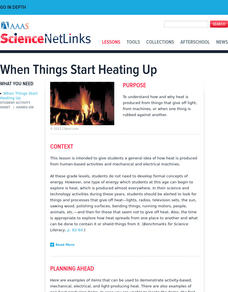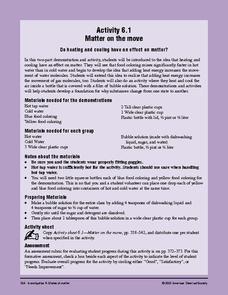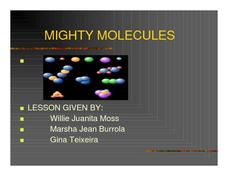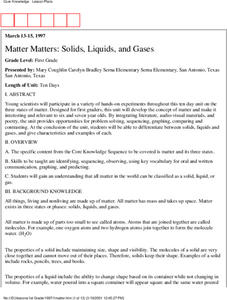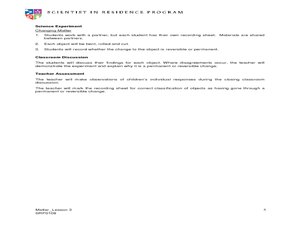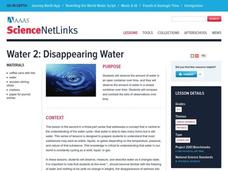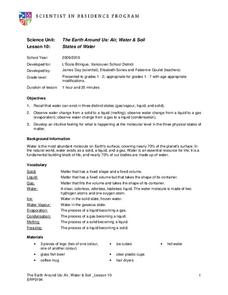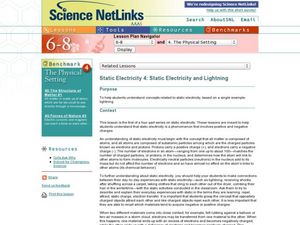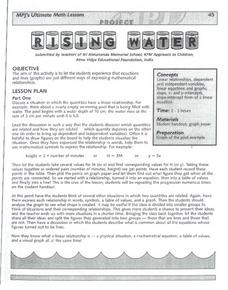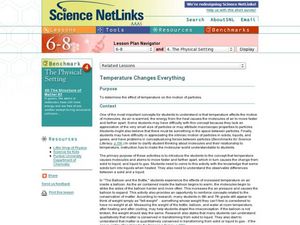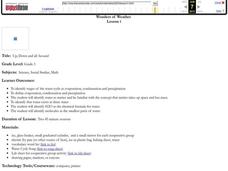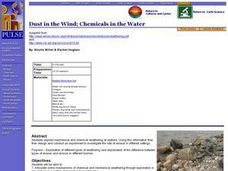Curated OER
Water 1: Water and Ice
Students experiment with states of matter with water and ice. In this states of matter lesson, students experiment to discover what happens to water as it freezes to become a solid, ice. They observe what happens when ice melts back to...
American Chemical Society
Matter on the Move
Start this mini unit on matter out by demonstrating how food coloring behaves when placed in cold and in hot water. Then have the class experiment with warm water and soap film. Pupils will learn that an increase in thermal energy also...
American Chemical Society
Mysterious M&M's
The first in a six-lesson mini unit, all using M&Ms® candies, this physical science activity gets kids to observe a single piece and discover what happens when it is placed in a plate of water. The activity can be used to...
Curated OER
Water and Ice
Young scholars perform experiments in pairs to visualize the changes in water during freezing and melting. In this properties of water lesson, students use their senses and inquiry tools to understand the changes in state of water....
Curated OER
Mighty Molecules
Learners examine a PowerPoint production on molecules. Then they construct their own molecule and define what an atom, molecule, and matter is. They make a H2, HCI, and an H2O molecule. Finally, a drawing to accompany the actual model is...
Curated OER
What Are The Properties of Sea Water?
Ninth graders conduct research on the subject of sea water. They use a variety of resources to obtain information. There are helpful resource links listed in the activity. In conjunction with the research students make inquiry of the...
Curated OER
Matter Matters: Solids, Liquids and Gases
Scientists participate in a variety of hands-on experiments in this ten-day unit on the three states of matter. Lessons incorporate literature, a-v materials, and poetry to help students differentiate between solids, liquids and gases.
Curated OER
Physical Changes to Matter
Pupils explore matter by conducting an in-class experiment. They experiment with water's various forms by melting and freezing water, identifying its new shape. These observations are recorded to supplement later discussion. They also...
Curated OER
Mixtures of Matter
Students experiment with solids and liquids. In this mixtures of matter lesson, students combine matter to form solutions. Students hypothesize, test, and analyze the data to draw conclusions. The lesson can be extended by having...
Curated OER
Disappearing Water
Students explore the water cycle. In this earth science lesson, students observe and measure water in a closed container and in an open container. Students record their observations and compare their sets of data to draw conclusions...
Curated OER
States of Water
Students investigate the 3 states of matter. In this physical science "matter" lesson plan, students observe and participate in a number of demonstrations involving melting and freezing water. Students observe the effect heat has on...
Curated OER
Matter and Molecular Motion
Fourth graders define the states of matter and their properties. They demonstrate the air is matter and observe the effect of molecular motion through these activities.
Curated OER
Physical and Chemical Properties of Matter
Learners identify the physical and chemical properties of matter. They review the types of matter. Students list the four states of matter (Solid, Liquid, Gas and Plasma). They recognize and describe the different types of matter.
Curated OER
Three States of Matter
Third graders investigate the three states of matter and the properties of materials as they undergo physical changes. They identify examples of each type of matter, role-play atoms in solids, liquids, and gases, and conduct an...
Curated OER
The Physical Behavior of Matter
Students distinguish between three phases of matter: solid, liquid and gas, on the molecular level. They compare and predict the relative compressibility of the three phases of matter through journal writings and drawings.
Curated OER
Amazing Water Changes
Learners explore the properties of water and how it changes states. In this kindergarten to 2nd grade science activity, students pair a hands-on science activity with two suggested books. This inquiry activity has...
Curated OER
What is Air?
Students investigate air by participating in a class experiment. For this matter measurement lesson, students identify air as a gas which consists of mass. Students utilize a windsock or balloon to measure oxygen and explore it's true...
Curated OER
Heat and Matter
Students explore liquids and solids by conducting in class experiments. In this matter lesson, students define the properties of matter and how heat can change those properties. Students experiment with heating objects such as butter and...
Curated OER
Changing States of Matter - Making Ice Cream
Students make ice cream as a result of viewing changes of states of matter. In this matter lesson plan, students learn how heating and cooling can effect a state of matter to change.
Curated OER
Rising Water!
Students observe water change from a liquid to a gas state when heated and then return to its liquid stage when cooled. They learn that gas molecules move faster than liquid molecules. They discover physical properties that describe how...
Curated OER
Water and Ice
Students observe water as it changes form. In this water lesson students observe, measure, and describe water as it changes state.
Curated OER
Temperature Changes Everything
Middle school chemists visit interactive websites in order to discover what happens to molecular motion when heat is added to matter. They conduct an experiment that demonstrates the expansion of matter with the addition of heat. A lab...
Curated OER
Wonders of Weather
Fourth graders complete activities to study weather and the water cycle. In this water cycle activity, 4th graders observe a demonstration of the three stages of water. Students work in groups to complete a water cycle lab activity....
Curated OER
Dust in the Wind; Chemicals in the Water
High schoolers explore mechanical and chemical weathering at stations. They articulate some mechanisms of chemical and mechanical weathering through exploration in a lab. Students stations describe how chemical weathering differs from...
